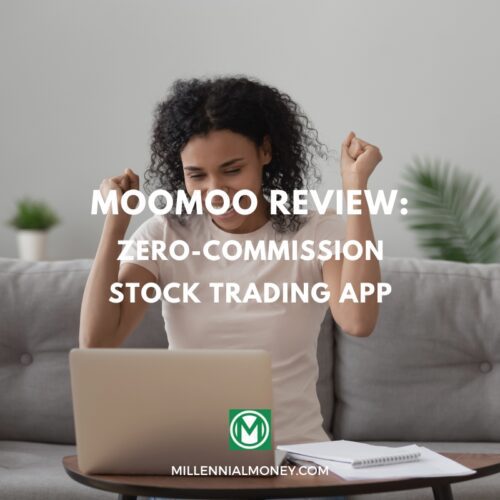Choosing the right investment app can greatly impact your investment portfolio. Not only does each app offer different types of accounts, charge different fees, and have different investment options, but they work differently, too.
Some investment apps are meant for beginners, and others are reserved for those who know what they’re doing and don’t want hand-holding.
Two of the most popularly compared investment apps are Public vs. Webull. These apps have many similarities and differences that you should understand to determine which is best for you.
Public vs Webull: Overviews
Public and Webull are popular trading apps that many beginning and experienced investors compare. While both work great for new investors and those with plenty of experience, they cater to different types of investors.
Here’s what you should know.
Overview of Public.com
Public is a more ‘relaxed’ trading app with a social aspect. Public offers extensive social support, allowing investors to follow one another for ideas and strategies. The app lets investors trade stocks, alternative investments, treasuries, and cryptocurrency.
However, Public doesn’t have a desktop app. Instead, you can access the platform via the web or their mobile app.
- Who Is Public Good For? Public is good for new and casual investors. Its social feel makes it feel more like a social media app than an investing app, but it’s both. So if you’re looking for guidance, want to follow in someone else’s footsteps, or like to run your strategies past someone before investing, Public may be the option for you.
- Who Should Avoid Using Public? If you want to open a retirement account or invest in securities that Public doesn’t offer, you may want to look elsewhere. Their research and data opportunities are also scarce, as they only provide research from Morningstar, which may not be enough for active investors looking to make immediate trading decisions.
Overview of Webull
Webull is research-heavy and provides plenty of technical data. It has a complex interface, but many investors prefer its in-depth research and features.
The app works on desktops and mobile devices. Investors can trade stocks, options, ETFs, and cryptocurrency.
- Who Is Webull Good For? Webull is best for active investors who rely on in-depth research. You get everything in one platform, making it easy to make fast decisions, which is necessary when you’re an active trader versus a set-it-and-forget-it trader.
- Who Should Avoid Using Webull? If you’re looking to trade mutual funds or bonds, you won’t find that at Webull. Also, if you’re brand new to investing, the platform can be overwhelming unless you have a solid understanding of investing.
Public vs. Webull: Types of Accounts
Webull Accounts
Webull offers both taxable and retirement accounts, giving investors many options to reach their financial goals.
Retirement Accounts
Retirement accounts are tax-advantaged accounts. Webull offers traditional and Roth IRA accounts, allowing you to choose between taking the tax benefits now (when you contribute) or during retirement.
- Traditional IRA Accounts: Traditional IRA contributions are pre-tax. This means you get the deduction in the year you contribute the funds. Any money you contribute grows tax-deferred, as do the earnings. But when you withdraw the funds in retirement, you’ll pay taxes at your current tax rate. These accounts are also subject to Required Minimum Distributions if you don’t withdraw funds early in retirement.
- Roth IRA Accounts: Roth IRA accounts are post-tax. This means you contribute funds after paying taxes on your earnings. However, the money you contribute and the earnings grow tax-free. Withdrawals also don’t incur a tax liability as long as the funds are in the account for at least five years before withdrawing them.
- Rollover IRA Accounts: Rollover IRA accounts are helpful when you change jobs or have other life changes that require you to change retirement accounts. Instead of cashing out the account and paying the 10% IRS penalty plus taxes, you can roll the funds over into a Webull retirement account and continue the advantages of a retirement account.
Individual Taxable Accounts
Taxable accounts don’t have tax benefits but can help you reach your financial goals. You are free to do with these funds as you want, buying and selling assets as often as you wish or even cashing the funds out.
You’ll pay taxes at your current tax rate for short-term capital gains (less than one year) and the long-term capital gains tax rate for securities held for longer than one year.
Public Accounts
Public doesn’t have as many account options as Webull because they don’t offer retirement accounts. However, for beginners, what Public offers may be enough.
Brokerage and Individual Taxable Accounts
Public’s accounts are individual taxable accounts, and they don’t have a joint account option. Therefore, any money you invest and withdraw will be subject to taxes in the tax year you withdraw the funds.
You can use tax loss harvesting techniques to minimize your tax liabilities with Public accounts, selling securities at a loss to offset large capital gains.
Using Public Premium
Public doesn’t have robust research options like Webull readily available. However, if you subscribe to their Premium content for $8/month, you’ll have access to the following:
- Advanced data
- Market metrics
- Analyst insights
Public vs Webull: Comparing Features
It’s helpful to look at the features offered by Public and Webull head-to-head to determine which is right for you.
Public vs Webull: Features on Both Platforms
The following features are similar for both Webull and Public.
Commission-Free Trading
Both platforms offer commission-free trading, which is a tremendous benefit. Also, neither platform charges a monthly fee. This means you can trade most securities for no charge, keeping more money in your investment account.
However, both platforms have miscellaneous fees, including those charged by regulatory bodies, so read the fine print to learn what trades might cost.
Account Minimums
Webull and Public don’t require account minimums unless you count the $1 Public requires, but how can you trade without even $1 in your account?
While it’s to your benefit to have money in your investment account, it’s nice to know there aren’t any minimums, making the platforms accessible to investors at all levels.
Fractional Share Opportunities
Having the ability to invest in fractional shares opens up many more opportunities to invest. Fractional shares mean you can buy less than one share of a stock and call yourself a stockholder. This is great for investors who want to invest in companies like Amazon or Disney but can’t afford their high share prices.
Offering Free Stock
What’s better than free stock? Both platforms offer sign-up bonuses to encourage you to try the platform.
Webull offers up to 12 fractional shares worth $3 to $3,000 depending on how much you contribute, and Public offers a ‘free slice of stock’ worth $3 to $300 when you open an account.
Cryptocurrencies
Both Webull and Public offer access to cryptocurrency. You can trade over 25 cryptocurrencies on both platforms, such as Bitcoin, Ethereum, and Dogecoin.
Public vs Webull: Difference in Features
Now that we’ve looked at the similarities between Public vs. Webull, let’s look at the differences, as this will help you determine which is right for you.
Mobile vs. Web-Based-Trading Across Platforms
Determine how you feel most comfortable investing because Webull and Public have different options.
Webull investors can invest on a desktop, an internet device, or a mobile app. You have many more options and can easily invest while on the go.
Public, on the other hand, only offers to invest in their mobile app. This is nice for investors who want flexibility, but if you’re an active investor or prefer not to conduct financial business on your mobile device, you won’t have that option with Public.
Advanced-Data and Research
Research is an area Webull excels, and Public leaves a lot to be desired. Webull offers free access to advanced research tools, including real-time market data and sophisticated charting tools. In addition, investors have access to fundamental and technical data, catering to all types of investors.
Public offers basic research options for investors and focuses its research by providing themes and categories to cater to investors. You can also choose the Premium account option to get more sophisticated research tools for an $8 monthly fee.
Paper Trading Opportunities
Paper trading allows you to try your investment strategies in real time but with paper money. Webull offers this opportunity, but Public doesn’t.
With Webull, you get $1,000,000 in paper money, and you can fictiously trade using real market data to see how your strategies work. Occasionally, Webull runs paper trading competitions, too, allowing investors to win real money if they win the contest.
Extended Trading Hours (Free)
Typical investing hours are 9:30 AM to 4 PM Eastern Standard Time. This is when most platforms allow trading. However, Webull offers extended trading hours free of charge. Investors can trade from 4 AM to 8 AM EST and again from 4 PM to 8 PM, allowing them to react to market events early or right after. When you place your trade, make sure to check ‘extended hours trading’ to execute your trade immediately.
Public offers extended trading hours, but only to Premium members. If you pay the monthly premium, you can trade 8 AM to 9:30 AM and 4 PM to 8 PM.
Expected Fees and Pricing
Webull and Public are commission-free platforms. However, they both charge fees for certain situations.
For example, Webull charges regulatory fees when you sell certain securities, such as stocks, ETFs, and options. Webull also charges for sending and receiving wires.
Public charges for outgoing wires, broker-assisted trades, returned checks, and stop payments.
It’s important to read the fine print before opening an account to understand the fees you may be subject to.
Chat and Communication
Webull and Public offer ways to get support, but how you get it may differ.
Webull’s customer support is available 24/7 via phone and email. However, plan to wait at least five minutes on the phone and a day for an emailed response. Many investors complain about the service provided by phone, but Webull offers suitable explanations and support via email.
Public offers several ways to connect with them:
- Email – [email protected]
- In-app chat – Log into your account and click the three lines at the top, selecting Help Center and Send a Message
- Web chat – Select Settings and Privacy, then Contact Support
- Social – You can find Public on Twitter and Instagram
Social Investment Platform
If you’re looking for a social network where you can connect with other investors to get ideas or run your strategies by them, you’ll find that on Public. Like social media platforms, you can follow other investors, get their ideas, and even mimic their portfolios.
Auto Dividend Re-Investment
You’ll only find this ability on Public if you like to automatically reinvest your dividends (it’s a smart investment strategy). But, unfortunately, Webull doesn’t automatically reinvest your dividends.
Prebuilt Investments and Portfolios
If you prefer portfolios already built for you, Public is the way to go. They offer portfolios in categories and themes, making it easy to put your money where you want it to go.
Webull is meant for advanced investors who want a more DIY approach to investing. They don’t have prebuilt portfolios because their investors prefer to build their own.
Public vs Webull: Pros and Cons
When comparing Webull vs Public, it’s important to look a the pros and cons. Here are factors to consider about both platforms.
Pros of Public
- Commission-free trading
- Extensive customer support options
- No account minimums
- Offers a robust social network
- Access to free educational support
Cons of Public
- Lack of free research options
- No desktop or web-based version
- No retirement accounts
- Your trading activity is public
Pros of Webull
- Commission-free trading
- 24/7 access to crypto trading
- Options for individual and retirement accounts
- Provides extensive research
- Offers the opportunity to invest using desktop, web-based, or mobile applications
Cons of Webull
- A difficult platform for new investors
- No educational opportunities
- Limited security options
- High wire fees
FAQs
Comparing Webull vs Public is a common comparison. Here are some of the questions I receive most often.
Which Platform Is Better, Public vs Webull?
There isn’t a one-size-fits-all answer to this question. The right platform for you is the one that offers the securities you want in the format you desire. Both platforms are commission-free, but Webull is better for advanced DIY investors, and Webull is better for beginners or those who like to follow other investors and have a social aspect of investing.
Is It Worth Using Public.com Premium?
Public Premium costs $10 a month, but it opens up more opportunities, including access to more robust research and extended hours trading. It also offers access to VIP customer service and personalized portfolio insights. If you use these features, it may be worth it, but compare it to other platforms that may include these options for free.
How Does Public.com Make Money?
Public doesn’t utilize payment order flow, which is how most brokers make money. Instead, they make money from the following:
- Optional tipping – This is completely optional but gives investors a chance to support Public’s decision to avoid payment order flow
- Interest on cash balances – Public earns interest on your uninvested cash
- Miscellaneous fees – Public also makes money on a subscription, instant withdrawal, and crypto transaction fees
How Does Webull Make Money?
Webull makes money using payment order flow, lending idle investments and cash, paid subscriptions, and margin fees.
Public vs Webull: Which Is Best For You?
The decision between Webull vs Public is a personal decision based on what you want out of your investment apps.
Both work well for beginners and experienced investors but cater to different types of investors. For example, if you want a retirement account, Webull is your only option, but if you prefer a social aspect to investing, Public is the better choice.
Active traders do better with Webull, and traders who want a more passive way to invest or don’t need excessive research do better with Public.
Determine what meets your investment needs and enjoy commission-free investing no matter which app you choose.






No comments yet. Add your own